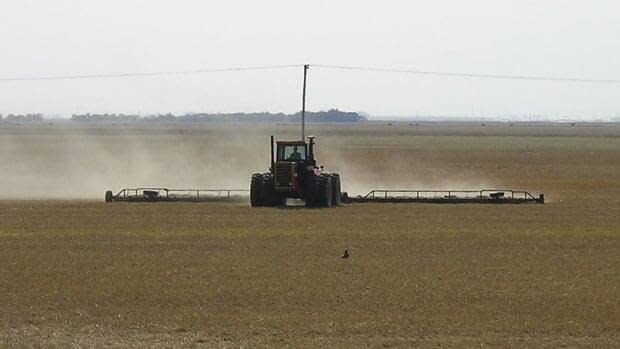Alberta farmers compelled to harvest crops early amid heat wave

Many farmers in Alberta are trying to salvage the little crop they've managed to grow amid an ongoing heat wave.
Farmers in some parts of the province have already started harvesting while others are preparing to start in the coming days.
Wayne Schneider, proprietor of Great West Farms in Nisku and a regional director with Alberta Canola Producers Commission, said the crops are nearing the end of their life cycle of what they can actually produce.
"It is too late," Schneider said Monday. "We're just hoping for the best — that whatever ground moisture there was will help finish off the little crop that there is."
The family-run farm grows canola, wheat, barley and yellow peas on about 728 hectares.
Schneider said he thinks his operation will yield about half the crop he gets in a typical year — about 40 bushels of wheat, down from the usual 70 bushels and 50 bushels of barley down from the typical 90.
For canola, he typically yields 50 to 60 bushels an acre — this year he's expecting about 30.
"This year, we didn't get the rain when we needed it," Schneider said. "With the exceptionally hot days, everything that was growing got heat stressed and it can't produce. It just shuts the plants down."
They normally start harvesting at the end of August, with the majority of the work done in September and October, Schneider noted.
It is too late. - Wayne Schneider, grain farmer
The Agriculture Financial Services Corporation, which provides crop insurance, also prepares a crop report.
As of July 27, less than 20 per cent of all crops in Alberta are considered in good to excellent condition.
The five-year and ten-year average is 71 per cent, the report shows.
Bleak year
In southern Alberta some farmers have already started harvesting, including Kevin Serfas, co-owner of Serfas Farms Ltd. in Turin, northeast of Lethbridge.
"Things are pretty bleak," Serfas said in an interview Monday.
His operation is producing about a quarter of the typical amount.
His farm yields 75 bushels an acre of cereal grains, and this year they're combining five to nine an acre.
"So it's a bit of a mess down here for sure," Serfas said. "It's going to be a mess for the next 12 months."
Most of the harvest will be sold to feed cattle, Serfas said, instead of being sold to overseas and domestic grain buyers.
Schneider and Serfas say governments need to step in.
Serfas, also chair of the Alberta Canola Producers Commission, said he hasn't discerned the benefits from a provincial/federal AgriRecovery program for crop farmers.
In a release from July 22, the Minister of Agriculture and Agri-Food Marie-Claude Bibeau said assessments were underway with Manitoba, Ontario, Saskatchewan, Alberta and British Columbia.
The federal government will collaborate with provincial governments to evaluate the extraordinary costs producers face and provide joint support as required, the release said.
On its website, the AFSC said it continues to monitor the situation and anticipates a number of claims in the coming weeks.
"Our team of adjusters are familiar with the current conditions, and they are working to resolve claims as quickly as possible," the site says.
"Top priority claims include those claims where clients have indicated they need to allow cattle to feed on the crop immediately."

 Yahoo Finance
Yahoo Finance 